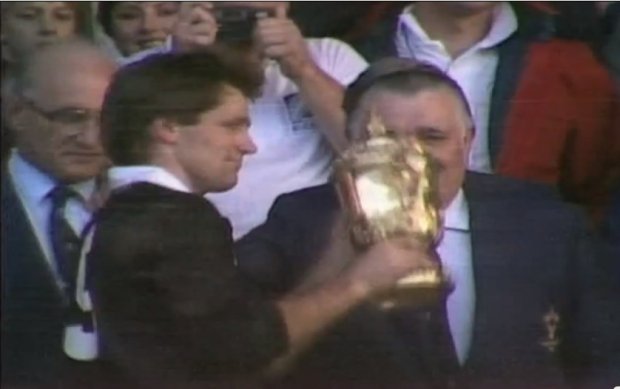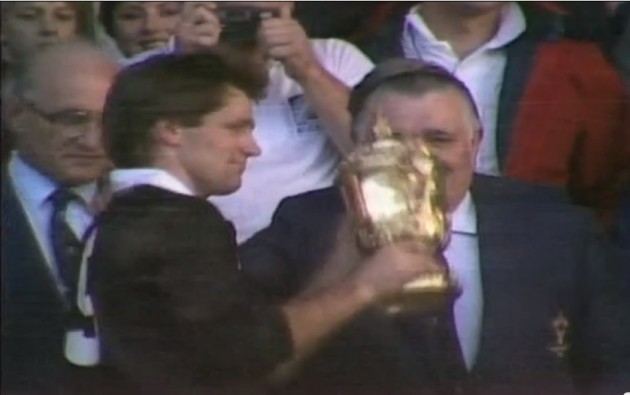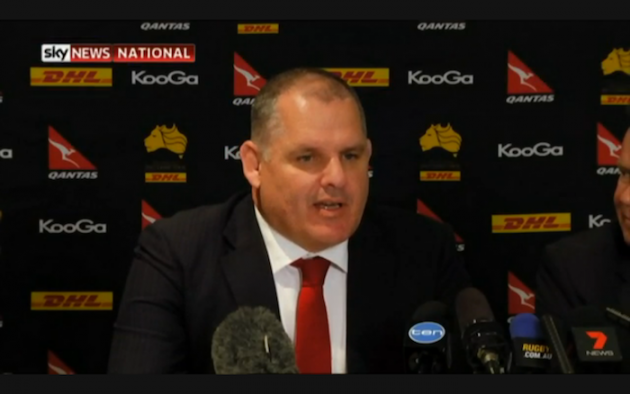Last night I had the privilege of hearing one of the legends of rugby – and indeed of corporate life – give an impassioned and educated assessment of why Australia has become a non-competitor for the Bledisloe Cup, and in effect killed it as a concept (a dramatic overstatement by his own admission).
I agreed with every bit of it – except the conclusion.
That man was David Kirk, World Cup-winning captain of the All Blacks, ex CEO of Fairfax, and now of TradeMe. If that wasn’t enough, we also found out that he had a Rhodes scholarship to study the most arduous of degrees, medicine, only to jack it in because ‘he didn’t fancy it’ and wanted a shot as business. As a former halfback he may not be giant in stature, but he certainly is in achievement.
It was in a full upstairs bar of the Sydney Rugby Club during a Rugby Business Network meetup (second Monday of each month at 5.30pm).
In front of a hungry (until the party pies arrived) and increasingly well oiled crowd, Kirk set about listing why he thought the Wallabies currently held the worst record of Bledisloe cup losses (10 straight) since the period 1949-1979 when Australia failed to win it 12 times in a row (it wasn’t contested every year).
Those key reasons were:
1. There is simply not enough competition in Australian rugby.
In New Zealand there is meaningful competition at school, club, provincial and even national (All Black trials) level. This does two things:
- Teaches teams and players to find how to win. It’s death or glory, so by hook or by crook you’ll find a way to get the win. It’s an engrained habit.
- As a player, you learn from a very early stage what you have to do to get in front of your rivals for the next step up. It’s a clear pathway and the only way up it is performance.
2. The high level of skills coaching from an early age.
It’s not just about having a run around on a Saturday morning – players are given technical coaching from an early age on the fundamentals. Forwards for example, are taught body height pretty much on the way out of the womb.
3. Culture.
The inbuilt will to win is just so strong that there’s no way players would be allowed by the group to do what our three amigos have been merrily doing for the last few years. In addition to that, the combination of points one and two mean that when it gets to the pointy end of a match, you don’t even think about winning or losing, just executing. Because you know if you execute, you’ll win.
I’m not sure anyone could quibble with these sound points for success.
The Kiwi cup winner’s upshot was that despite the bright new era kicking off this weekend, we shouldn’t be expecting a return to the heydays of the ’80s and ’90s, considering that minus Benn Robinson and plus Quade Cooper (who will bring the same baggage as ever), the Wallabies will be the same physical group of players under Ewen McKenzie as they were under Robbie Deans. That it will take a long time and serious reform before the Wallabies can close the gap.
And this is where I disagree.
Of the three points above, I don’t see how the first two haven’t always been a challenge for Australian rugby.
The glaring statistic that I can’t get past is the who’s been in charge of setting the team culture for the past seven out of ten years – the Cantabrian Robbie Deans.
In response to this same point raised last night in a cameo by Matt Dunning, Kirk did concede that while he is an excellent coach, Deans ‘didn’t understand the Australian culture’, and then moved on.
The general Kiwi line is that Deans may have a flaw or two but he is a coach with an outstanding record (a New Zealander after all) and therefore the problem is with Australian players who just aren’t up to it (see points 1-3 above).
The flaw in this logic is that I can’t see that Australian playing stocks have suddenly nose-dived in the last 10 years. If anything, I believe the natural talent currently in gold rivals, maybe even surpasses other eras.
Look at how two Australian super teams, one made largely from ‘no names’ only two years ago have performed this year. Both making it to the finals, the Reds beating every Kiwi province along the way, the Brumbies closing out two great finals series wins and executing their way to within a held-up try in the grand final.
At the end of the regular season, Australian teams had a 12-8 winning record against their trans-Tasman rivals.
What I think David underestimates is just how right he is about his third point – culture. It’s what Ewen McKenzie changed at the Reds, Michael Cheika is changing at the Waratahs and what Jake White transformed at the Brumbies – and Jake is clearly not Australian, proving it’s got nothing to do with nationality, just ability.
I agree with David Kirk that deep structural improvements are needed if Australian rugby is to break New Zealand’s dominance of world rugby in any permanent way (and I suspect if he thought there was any danger of that really happening, he wouldn’t be telling us how to do it!).
However, reviving this Bledisloe Cup into a truly hard-edged competition need not only take far less time, I believe we have the tools to do it.
As the business saying goes – culture beats strategy, every time.




